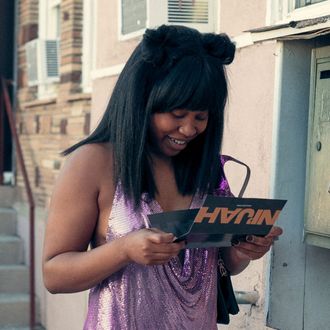
Swarm begins each episode with a curious preamble: “This is not a work of fiction,” reads the introductory title card. “Any similarity to actual persons, living or dead, or actual events, is intentional.” It may seem like a peculiar way to position a seven-part limited series about a fictional stan named Dre (Dominique Fishback) who goes on a two-year-long murderous rampage to defend her favorite pop artist, Ni’jah, but anyone who has binged Swarm, or even just glimpsed the trailer, knows that Ni’jah is an avatar for the real-life Queen Bey, and her die-hard fans, the Killer Bees, represent the Beyhive. “We approached [the similarities to Beyoncé] with a lot of respect,” creator Janine Nabers told Vulture. “The legal stuff we did was very calculated, purposeful, and thoughtful. If it happens, you can write about it. When things happen out in the world and you’re a public person — legally, we’re not lying. We presented everything: ‘This is not a work of fiction.’ That’s the first thing you see when you look at this show. And it was cleared legally because it is not a work of fiction.”
Set in Houston and a grab bag of other American cities and towns during Ni’jah’s Festival era — a time period that’s analogous to Beyoncé’s Lemonade promotions, which ended with a masterful headlining performance at Coachella — the Prime Video show had no choice but to appropriate notable moments by virtue of the fact that they are stuck in our collective pop consciousness. “When you’re making a show about the culture, you have to think about the moments within that two-and-a-half-year time period that, as Black people with music, culturally broke through the noise,” Nabers explained. “When you are telling a time period within a very iconic point in an artist’s life — real events that happened between 2016 and 2018 — you’re hitting the benchmarks people will be talking about for years to come.”
Cultural events, especially those concerning Beyoncé, take on a kind of historical significance for pop obsessives. “When you see something, anything, in an elevator, you’re going to think about the moment you saw that thing happen and where you were and who you called and who you texted,” she said, referencing Solange’s fight with Jay-Z in an elevator at the Standard hotel, a seismic event that was splashed across “Page Six” and eventually became seared into our memory (and it’s spoofed in Swarm). “It’s about the feeling of being somewhere when our version of the Berlin Wall came down.”


